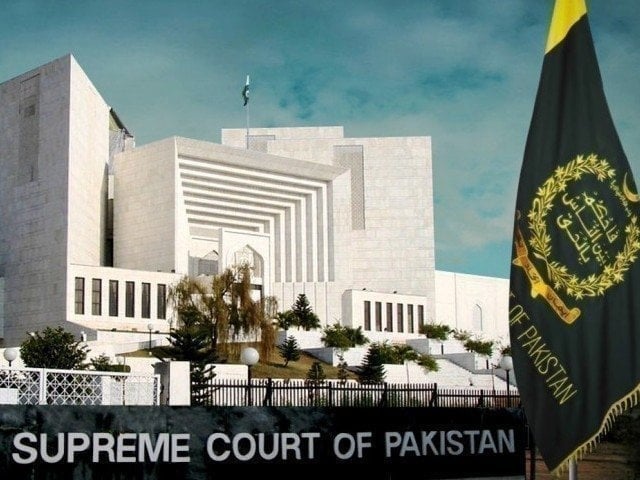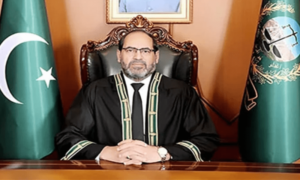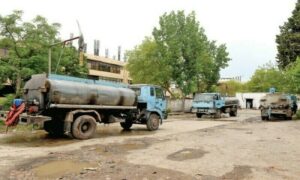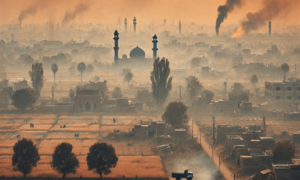ISLAMABAD:
The Constitutional Bench of the Supreme Court on Thursday raised questions about the decision of the relevant authorities to divide cases from the May 9, 2023 riots between military courts and anti-terrorism courts (ATCs).
During the hearing of the intra-court appeal regarding the military trial of civilians, Defense Ministry lawyer Khawaja Haris argued that the apex court’s ruling implied that even enemies like Indian spy Kulbhushan Jadhav could not be tried in military courts.
The seven-member Constitutional Bench, led by Justice Aminuddin Khan, continued hearing the appeal. During the proceedings, Khawaja Haris presented his arguments, while the judges raised several questions, including a reference to Indian spy Kulbhushan Jadhav.
The appeal before the bench stemmed from the verdict of a five-member bench of the top court in October 23, 2023 that allowed the petitions against the trial of civilians involved in the May 9, 2023 riots and declared their military trial as null and void.
During the arguments from Khawaja Haris, Justice Muhammad Ali Mazhar asked the lawyer that since the Supreme Court had declared cause (d) of subsection (1) of Section (2) of the Army Act as null and void, then could spy like Kulbhushan Jadhav be tried in military courts.
Dilating on the overall impact of the Supreme Court ruling, Khawaja Haris replied that after the judgment, even the spy could not be tried in military courts. On that Justice Jamal Khan Mandokhail stressed the need for strengthening the prosecution.
“Why are we not strengthening our prosecution system? Why are the anti-terrorism courts not strengthened,” Justice Mandokhail asked. He added that the courts had taken the decisions only after looking at the evidence; therefore, the prosecution needed to be strengthened.
Justice Mandokhail, and other bench members, including Justice Naeem Akhtar Afghan and Justice
Musarrat Hilali, asked the lawyer about the criterion and authority to decide which case would go to which court.
Justice Afghan said that 103 accused in May 9 cases were tried in military courts, while the remaining cases were being tried in the ATCs. He asked how this distinction was made.
Justice Afghan also asked Khawaja Haris about any decision of the ATCs for handing over the accused to military custody. “Which case will go to military courts and which will not, how this distinction is made,” asked Justice Hilali.
Haris argued that the Supreme Court, in its decision, had rendered Article 233pertaining to a state of emergencyineffective. He stated that while Article 233 was unrelated to the military courts case, it was invoked to demonstrate the proper interpretation of Article 8(5).
Explaining Article 233, Haris noted that it grants the president the authority to suspend fundamental rights during a state of emergency. In response, Justice Mazhar remarked that Supreme Court rulings on matters of fundamental rights clarify that courts can exercise their authority even during an emergency.
Justice Aminuddin Khan said that during the emergency fundamental rights could be defended in courts, only their implementation was suspended. Justice Hilali pointed out that in the present case, fundamental rights were not suspended when the accused were taken into military custody.
Haris said that the Supreme Court’s decision had said that stopping the execution was equivalent to suspending fundamental rights. Justice Hassan Azhar Rizvi said that there were attacks on military installations in the past. He asked where all those cases were tried.
Justice Mandokhail remarked that every court, including the military court, must be respected, but military courts should be established within the framework of the Constitution, adding that the Supreme Court had determined that no court could be established in conflict with the Constitution.
During the hearing, the additional advocate general of Punjab presented a report regarding the claims of solitary confinement of the May 9 convicts. Justice Aminuddin Khan said that the court could not give any order regarding the convicts. The hearing of the case was adjourned until Friday (today).







